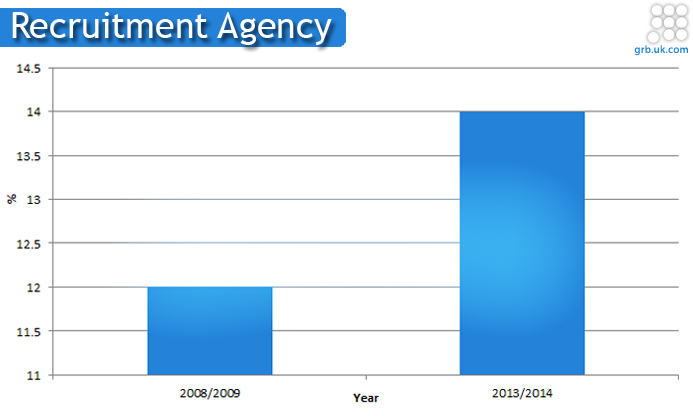You're one of two million graduates entering the jobs market. Yes, two million. Fact. After all the hours spent surviving all-nighters in the library, copious amounts of caffeine and heart palpitations caused by deadlines, you deserve to find the best possible job after graduation. Right? So, here at the GRB we've had access to research that finally reveals the top five methods graduates have successfully used to start their careers over the last seven years...
1. Having already worked there

The most successful and constant method of finding a job once you've graduated is by having already worked, or had some experience at the company. The number of graduates finding a job this way increased by 4% from 2008 to 2011.
This highlights the importance of being proactive whilst doing your degree, not just
after you graduate. Balancing your uni work with your social life and extracurriculars is a challenge for most students. However, getting some work experience or an internship whilst at uni or during the holidays can give you a vital foot in the door; you can establish contacts and connections to help you when it comes to applying for jobs after your degree. An annual review of graduate vacancies by
High Fliers details that an estimated 31% of all graduate vacancies on offer in 2015 will go to graduates who have already had some experience with the company through work experience or taster courses.
More and more companies are now targeting first and second year students in order to recruit them straight after they've graduated. There has been a growing trend over the last couple of years in companies offering paid placements or internships and introductory open days or taster courses for students whilst they are still at university. This will also help you to gain relevant insight into various fields of work rooting out what it is that interests you and what you are good at as well as demonstrating to employers that you are a motivated and committed individual.
Action Point: Look back at your Summer jobs, internships or work experience and drop them a line. Remember me?!
2. Personal contacts, networking
The second most successful method of finding a graduate job was through the use of personal contacts and networking through them. Despite how it sounds, this method of finding a job isn't just reserved for the trust-fund babies; anyone can network through family, friends, neighbours, teachers etc. This type of networking can be invaluable and also help to build up your communication and confidence. Keeping in contact with connections you have made can prove to be a vital resource in the graduate job hunt to come.
Social media is becoming a great tool for this type of networking. Sites such as LinkedIn are excellent for professional networking, helping you to establish connections and circulate your profile to a wider range of potential employers and recruiters.
Action Point: Tell the world you are looking for a job and leave no stone unturned. Six degrees of separation is more like three, thanks to the internet.
3. Recruitment agencies

Over recent years the number of students finding jobs through recruitment agencies has been steadily increasing. Recruitment agencies are a valuable resource for graduates who are trying to navigate the choppy waters of the job market after leaving university. Recruitment agencies are well placed to find graduate opportunities as they have a vast network of clients who use them to source potential employees. Recruiters can then pick out candidates whose skills, experience and personalities will be most compatible with a specific role and company. Signing up to a recruitment agency gives you exposure to a whole new world of opportunities that you probably would not have even known existed or had otherwise had access to.
The number of graduates using recruitment agencies is likely continue to increase as the graduate job market gets more and more competitive due to the constant rise in the amount of people going to university.
Action Point: Register with one now. If it's temporary or permanent work, choose a specialist agency who will have more contacts than you'll believe and they'll give you amazing support along the way. And it's free!
4. Employer's website
This is perhaps the most direct way of finding a graduate job and the number of graduates finding jobs using employer's own websites has slightly increased as the internet has become a vital information tool. Do some research into companies in fields that interest you and educate yourself on the company background, vacancies and the application process and deadlines.
Action Point: You've probably already tried this but look beyond the obvious big name recruiters. Think laterally and you'd be amazed what you'd find with a day's research - plus, you've stolen a march on the competition.
5. Newspaper/ magazine ad

Another way to find a graduate job is through newspaper or magazine ads. However, newspapers are a declining media with the ABC showing that the newspaper market is in a year-on-year decline of 8%. With the exponential advances in technology, it seems that social media and other forms of finding graduate jobs have taken over. Instead perhaps look online to social media, employers' websites and recruiter advice and ads.
Action Point: Some employers use old school methods like print advertising so grab a local newspaper and turn to the vacancies section. You never know.
Source:
HESA The most successful and constant method of finding a job once you've graduated is by having already worked, or had some experience at the company. The number of graduates finding a job this way increased by 4% from 2008 to 2011.
This highlights the importance of being proactive whilst doing your degree, not just after you graduate. Balancing your uni work with your social life and extracurriculars is a challenge for most students. However, getting some work experience or an internship whilst at uni or during the holidays can give you a vital foot in the door; you can establish contacts and connections to help you when it comes to applying for jobs after your degree. An annual review of graduate vacancies by High Fliers details that an estimated 31% of all graduate vacancies on offer in 2015 will go to graduates who have already had some experience with the company through work experience or taster courses.
More and more companies are now targeting first and second year students in order to recruit them straight after they've graduated. There has been a growing trend over the last couple of years in companies offering paid placements or internships and introductory open days or taster courses for students whilst they are still at university. This will also help you to gain relevant insight into various fields of work rooting out what it is that interests you and what you are good at as well as demonstrating to employers that you are a motivated and committed individual.
Action Point: Look back at your Summer jobs, internships or work experience and drop them a line. Remember me?!
The most successful and constant method of finding a job once you've graduated is by having already worked, or had some experience at the company. The number of graduates finding a job this way increased by 4% from 2008 to 2011.
This highlights the importance of being proactive whilst doing your degree, not just after you graduate. Balancing your uni work with your social life and extracurriculars is a challenge for most students. However, getting some work experience or an internship whilst at uni or during the holidays can give you a vital foot in the door; you can establish contacts and connections to help you when it comes to applying for jobs after your degree. An annual review of graduate vacancies by High Fliers details that an estimated 31% of all graduate vacancies on offer in 2015 will go to graduates who have already had some experience with the company through work experience or taster courses.
More and more companies are now targeting first and second year students in order to recruit them straight after they've graduated. There has been a growing trend over the last couple of years in companies offering paid placements or internships and introductory open days or taster courses for students whilst they are still at university. This will also help you to gain relevant insight into various fields of work rooting out what it is that interests you and what you are good at as well as demonstrating to employers that you are a motivated and committed individual.
Action Point: Look back at your Summer jobs, internships or work experience and drop them a line. Remember me?!
 Over recent years the number of students finding jobs through recruitment agencies has been steadily increasing. Recruitment agencies are a valuable resource for graduates who are trying to navigate the choppy waters of the job market after leaving university. Recruitment agencies are well placed to find graduate opportunities as they have a vast network of clients who use them to source potential employees. Recruiters can then pick out candidates whose skills, experience and personalities will be most compatible with a specific role and company. Signing up to a recruitment agency gives you exposure to a whole new world of opportunities that you probably would not have even known existed or had otherwise had access to.
The number of graduates using recruitment agencies is likely continue to increase as the graduate job market gets more and more competitive due to the constant rise in the amount of people going to university.
Action Point: Register with one now. If it's temporary or permanent work, choose a specialist agency who will have more contacts than you'll believe and they'll give you amazing support along the way. And it's free!
Over recent years the number of students finding jobs through recruitment agencies has been steadily increasing. Recruitment agencies are a valuable resource for graduates who are trying to navigate the choppy waters of the job market after leaving university. Recruitment agencies are well placed to find graduate opportunities as they have a vast network of clients who use them to source potential employees. Recruiters can then pick out candidates whose skills, experience and personalities will be most compatible with a specific role and company. Signing up to a recruitment agency gives you exposure to a whole new world of opportunities that you probably would not have even known existed or had otherwise had access to.
The number of graduates using recruitment agencies is likely continue to increase as the graduate job market gets more and more competitive due to the constant rise in the amount of people going to university.
Action Point: Register with one now. If it's temporary or permanent work, choose a specialist agency who will have more contacts than you'll believe and they'll give you amazing support along the way. And it's free!
 Another way to find a graduate job is through newspaper or magazine ads. However, newspapers are a declining media with the ABC showing that the newspaper market is in a year-on-year decline of 8%. With the exponential advances in technology, it seems that social media and other forms of finding graduate jobs have taken over. Instead perhaps look online to social media, employers' websites and recruiter advice and ads.
Action Point: Some employers use old school methods like print advertising so grab a local newspaper and turn to the vacancies section. You never know.
Source: HESA
Another way to find a graduate job is through newspaper or magazine ads. However, newspapers are a declining media with the ABC showing that the newspaper market is in a year-on-year decline of 8%. With the exponential advances in technology, it seems that social media and other forms of finding graduate jobs have taken over. Instead perhaps look online to social media, employers' websites and recruiter advice and ads.
Action Point: Some employers use old school methods like print advertising so grab a local newspaper and turn to the vacancies section. You never know.
Source: HESA



